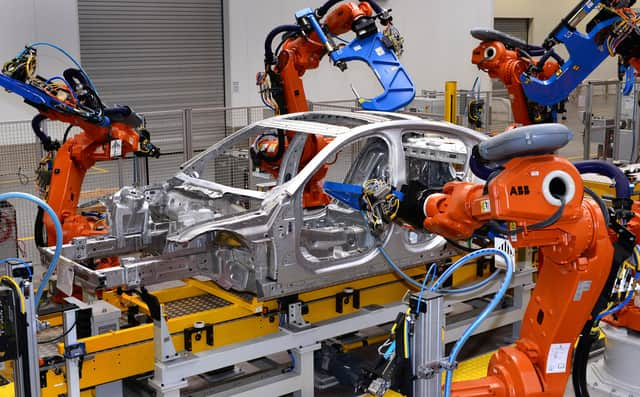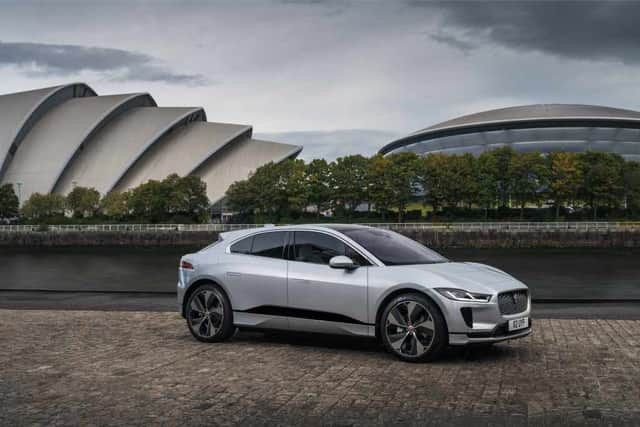JLR owner to build £4bn EV battery plant in UK


The owner of British car group JLR is to build a massive electric vehicle battery factory in the UK, it has been confirmed.
Tata Sons has announced that it will invest £4 billion in developing the so-called “gigafactory”, which is predicted to employ up to 4,000 people. The plant is expected to be built in Somerset, although Tata would not confirm that.
Advertisement
Hide AdAdvertisement
Hide AdThe announcement comes after months of rumours that the industrial giant was looking at options in the UK and Spain for its first battery factory outside of India. The UK government confirmed it had offered the Indian group subsidies to bring the factory to the UK but would not reveal the sums involved.
The factory will have a capacity of 40GWh when fully operational, making it one of the biggest battery plants in Europe. Based on estimates from research body the Faraday Institution, this could be enough to supply almost half of all the UK’s EV production needs by 2030.
The move is seen as a potential lifeline for the UK car industry, which many warned was under threat from a lack of investment in electric vehicle technology. It comes six months after plans for the BritishVolt battery factory in north-east England collapsed amid funding problems.
Prime Minister Rishi Sunak said Tata’s decision was a “huge vote in confidence in Britain” while Transport Secretary Grant Shapps called it the biggest investment in the UK’s car industry for 40 years.
Advertisement
Hide AdAdvertisement
Hide AdSunak commented: “This will be one of the largest ever investments in the UK automotive sector. It will not only create thousands of skilled jobs for Britons around the country, but it will also strengthen our lead in the global transition to electric vehicles, helping to grow our economy in clean industries of the future.”
N Chandrasekaran, chairman of Tata Sons, said: “The Tata Group is deeply committed to a sustainable future across all of our business. Our multi-billion-pound investment will bring state-of-the-art technology to the country, helping to power the automotive sector’s transition to electric mobility, anchored by our own business, JLR.
“With this strategic investment, the Tata Group further strengthens its commitment to the UK, alongside our many companies operating here across technology, consumer, hospitality, steel, chemicals, and automotive.”


The factory will initially make batteries for Jaguar and Land Rover vehicles and others from the wider Tata Motors group, but it is thought that in future it could also supply batteries for other brands.
Advertisement
Hide AdAdvertisement
Hide AdEarlier this year JLR (formerly Jaguar Land Rover) was among car brands that warned the UK’s car industry would struggle to remain competitive under post-Brexit laws on a vehicle’s country of origin. A key element of that was the proportion of a car’s value tied up in the battery, which could leave any cars built in the UK but using batteries from overseas liable to high import/export duties.
Building batteries in the UK is seen as key to the long-term future of the country’s car industry but there is currently only one other factory in the pipeline after the BritishVolt collapse.
The massive extension of the Envision plant in Sunderland, which supplies batteries to the nearby Nissan plant where the Leaf EV is built, should bring an additional 35GWh of capacity by 2030.
Mike Hawes, chief executive of the Society of Motor Manufacturers and Traders, called the announcement a "shot in the arm" for the UK auto industry. He said: "It comes at a critical moment, with the global industry transitioning at pace to electrification, producing batteries in the UK is essential if we are to anchor wider vehicle production here for the long term. We must now build on this announcement by promoting the UK’s strengths overseas, ensuring we stay competitive amid fierce global pressures and do more to scale up our EV supply chain.
Advertisement
Hide AdAdvertisement
Hide AdThe announcement was also welcomed by EV campaigner, motoring writer and founder of the FairCharge campaign Quentin Willson, but he warned there were fears in the industry that the Tata deal could monopolise any government support.
He said: “While this is a very significant development for UK battery manufacturing, I truly hope that other companies in the battery, critical minerals, charging and EV supply chains won’t be neglected. The Government should see this subsidy as the beginning of building a battery ecosystem in this country.
“There is a genuine fear in the industry that it could sweep up all available government support, which would be hugely detrimental to the future health of the UK in the race to zero. We have some world class battery and EV talent and we must support them as much as we can to prevent this valuable resource of innovators moving to other more receptive markets.”
Responding to the news, Jonathan Reynolds, Labour’s Shadow Business Secretary, said: "Labour welcomes any investment in British jobs and industry and decisions like these vindicate Labour's advocacy of an industrial strategy in place of scattergun announcements.
Advertisement
Hide AdAdvertisement
Hide Ad“In spite of the Government's cack-handed approach to industry and our economy this shows the strength of the UK automotive industry.
“Labour has been clear that the public and private sector working together is the only way we can transition industry to keep the jobs of the future on our shores for decades to come. That's why a Labour Government will go further with a proper industrial strategy, investing in eight gigafactories and delivering clean energy by 2030.”
Comment Guidelines
National World encourages reader discussion on our stories. User feedback, insights and back-and-forth exchanges add a rich layer of context to reporting. Please review our Community Guidelines before commenting.
